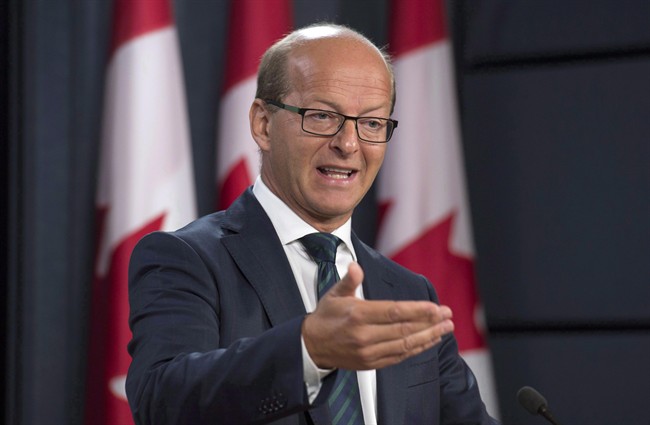In October of 2015, Justin Trudeau, on the verge of being elected prime minister, was asked a pointed question during a press scrum. Trudeau was surrounded by supporters and there was some groaning and moaning from the Liberals about the question.

Trudeau turned away from the microphone and shouted at his own partisans, “Hey! Hey! We have respect for journalists in this country! They ask tough questions and they’re supposed to.”
WATCH: Trudeau silences boos after Gagnier mentioned, defends ‘tough questions’ journalists have to ask
It was an eyebrow-raising moment at the end of an eventful campaign. It made for great TV. And it was, on a purely personal level, nice to hear. The problem is, in Canada, it’s not true, and never has been.
Soon, though, it might be. And that would be a good thing all Canadians.
Canadian journalists have never operated under a so-called shield law that allows us to protect the confidentiality of our sources (which could, one day, be you). Without such a law, sources, who may have vital information, critical to the public interest, that they are not supposed to share, can be understandably reluctant to approach the press.
It’s not that journalists don’t have rights — we do — but not special or specific ones. When journalists publish or broadcast, we’re using the same freedom of expression rights you have. When we speak with sources, on or off the record, we’re availing ourselves to the rights to freedom of association and movement that anyone in Canada enjoys.
Normally, this is enough.
Journalism is rewarding and important work, but the day-to-day grind is surprisingly uneventful. Most stories are assembled by a combination of careful research and interviews with willing subjects. But sometimes, things get more dicey. And that’s when people who may well be sitting on critical information need to know they can speak with the press without fear of legal or financial consequence. That’s why it’s so important that when a reporter promises confidentiality, they need to be able to mean it.
Many Canadians, highly influenced by American pop culture, probably believe that Canadian journalists, like their American counterparts, already have a clearly established right to protect the identity of a source who supplies them with information.
The opposite is true.
In 2010, while I was employed at the National Post, the paper lost a battle at the Supreme Court of Canada on exactly this matter. The case, which took a decade to reach its conclusion, involved bank documents, alleging financial impropriety by then-prime minister Jean Chretien, that was passed to a National Post journalist on condition of confidence. The police then obtained a warrant to seize and examine the documents, but the National Post refused to provide them, citing a right to protect its source.
In its final ruling, by a margin of 8 to 1, the court agreed that there might be cases where a journalist or news organization may have a valid legal claim to protect the privacy of a specific source, but that there was not a broad, automatic right to protect sources.
I disagreed with the ruling at the time, but it was, at least, clear. In the absence of a specific law protecting the rights of journalists and their sources, Canadian journalists (and potential sources) had to make their own decisions accordingly.
This issue has been in the news of late because Ben Makuch, a reporter at Vice, has resisted police demands for records of conversations he had during interviews with an accused Canadian jihadist, so as to assist in his prosecution. Makuch refused, and Vice backed him. They lost in court again just a few months ago, and this matter, too, may go all the way to the top court.
Time will tell what comes of Makuch and his principled stand (in a debate among journalists just over a year ago, I noted that the law was clearly against Makuch, and he should have known so, but he had my moral support).
Future Canadian journalists may be spared his ordeal, though. A bill that would establish a source protection law for Canadian journalists, originally introduced by Sen. Claude Carignan, has now been adopted by the federal Liberals. It is rare for a government to back a private member’s bill, even rarer for it to back a bill from the Senate, and rarer even still for it to adopt a private member’s bill from the Senate introduced by a member of the opposition party — Carignan is a Conservative. This is a sign, clearly, that the prime minister has become convinced this is an issue worth pursuing. He’s right.
Bill S-231 has not become law yet; it is still subject to some amendment work. And the right to protect sources would not be utterly absolute; in cases where there was no other way for police to obtain the information, they would need to prove to a judge that their need for the information was more important than the journalist’s need to protect a source.
But this is still a huge step in the right direction, and it’s one I’ve become increasingly convinced is necessary. I have generally been reluctant to treat journalists as a special class of citizen, somehow removed and separate from the society they’re supposed to cover. I also believe that journalism should not be a credentialed class or profession, as that would impose pointless barriers to entry — anyone can and should be able to be a journalist. But democracy is under siege the world over, and one of the first lines of defence in a free society is a thriving, aggressive and fearless press.
A shield law won’t solve all the problems facing my industry. It won’t help restore our often rapidly collapsing business models, or restore our credibility in the eyes of a public quick to dismiss any story that challenges their worldview as “fake news.” But good, accurate, high-quality reporting might help tackle both those problems.
A shield law will make that kind of fearless journalism more common in Canada. And we’d all — journalist and public alike — be better off for it.
Matt Gurney is host of The Morning Show on Toronto’s Talk Radio AM640 and a columnist for Global News.







Comments